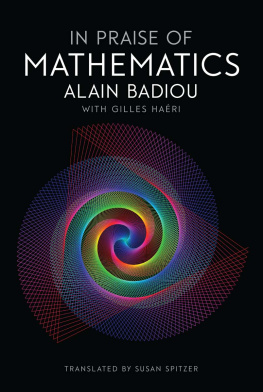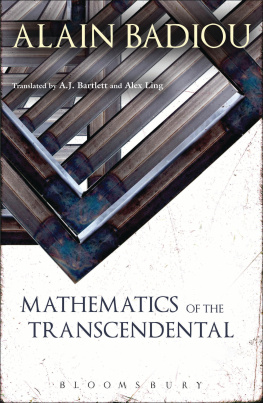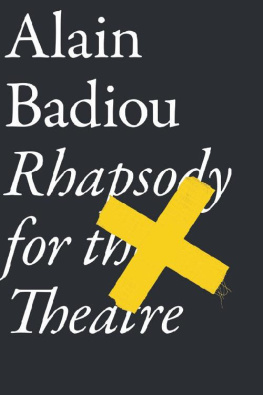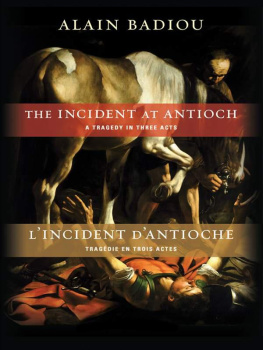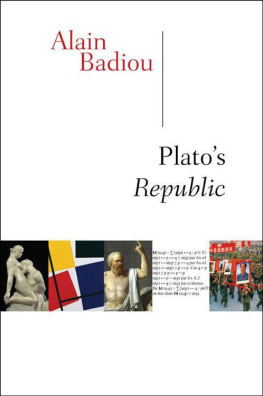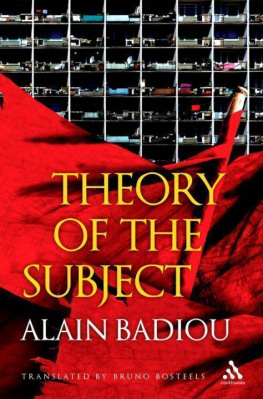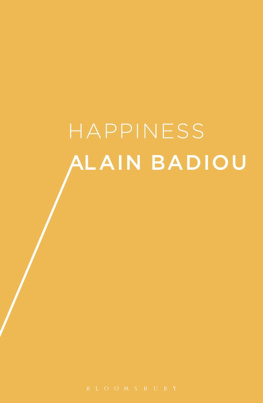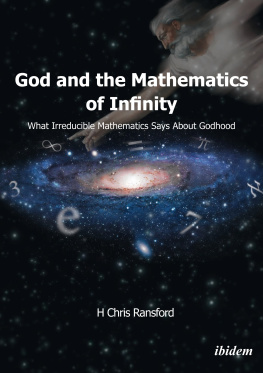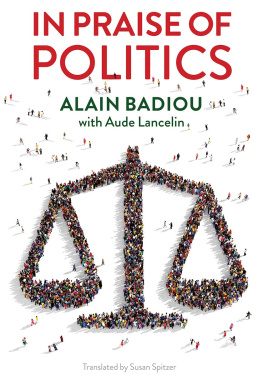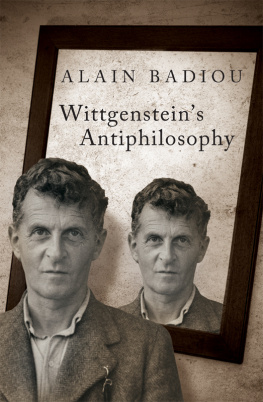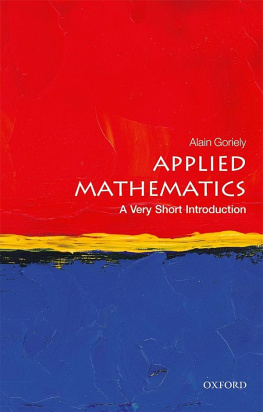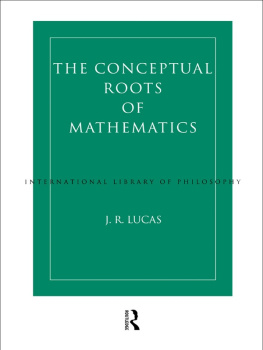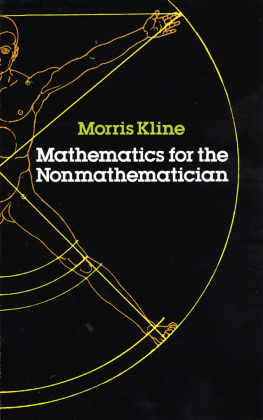Contents
Pages

In Praise of Mathematics
Alain Badiou with Gilles Hari
Translated by Susan Spitzer
polity
First published in French as loge des mathmatiques Flammarion, Paris, 2015
This English edition Polity Press, 2016
Polity Press
65 Bridge Street
Cambridge CB2 1UR, UK
Polity Press
350 Main Street
Malden, MA 02148, USA
All rights reserved. Except for the quotation of short passages for the purpose of criticism and review, no part of this publication may be reproduced, stored in a retrieval system, or transmitted, in any form or by any means, electronic, mechanical, photocopying, recording or otherwise, without the prior permission of the publisher.
ISBN-13: 978-1-5095-1206-5
A catalogue record for this book is available from the British Library. Library of Congress Cataloging-in-Publication Data
Names: Badiou, Alain, author. | Hari, Gilles, author.
Title: In praise of mathematics / Alain Badiou, Gilles Hari.
Other titles: loge des mathmatiques. English
Description: Malden, MA : Polity Press, 2016. | Includes bibliographical references and index.
Identifiers: LCCN 2016012538| ISBN 9781509512027 (hardback : alk. paper) | ISBN 9781509512034 (pbk. : alk. paper)
Subjects: LCSH: Mathematics--Philosophy. | Badiou, Alain--Interviews. | Hari, Gilles--Interviews.
Classification: LCC QA8.4 .B33713 2016 | DDC 510.1--dc23 LC record available at https://lccn.loc.gov/2016012538
The publisher has used its best endeavours to ensure that the URLs for external websites referred to in this book are correct and active at the time of going to press. However, the publisher has no responsibility for the websites and can make no guarantee that a site will remain live or that the content is or will remain appropriate.
Every effort has been made to trace all copyright holders, but if any have been inadvertently overlooked the publisher will be pleased to include any necessary credits in any subsequent reprint or edition.
For further information on Polity, visit our website: politybooks.com
Many years ago a little before and a little after my first philosophical opus, Being and Event (1988) I introduced the concept of the conditions of philosophy, which youll encounter later in this book. The aim was to identify precisely the real types of creative activity of which humanity is capable and on whose existence philosophy depends. Indeed, it is clear that philosophy was born in Greece because in that country, beginning, at any rate, in the fifth century BCE, there were some totally new ideas about mathematics (deductive geometry and arithmetic), artistic activity (humanized sculpture, painting, dance, music, tragedy, and comedy), politics (the invention of democracy), and the status of the emotions (transference-love, lyric poetry, and so on). So I suggested that philosophy really only develops when new advances emerge in a set of truths (thats the name I give them for philosophical reasons) of four different types: science, art, politics, and love. Thats why I responded positively to Nicolas Truongs invitation to have a dialogue with him in praise of love, and then in praise of theater, in Avignon. Likewise, I accepted Gilles Haris proposal of a dialogue in praise of mathematics in the setting of the Villa Gillet in Lyon. The first two conversations resulted in books published in Flammarions Caf Voltaire series. [English translations: In Praise of Love, New Press, 2012, and In Praise of Theatre, Polity, 2015.] The same is true of the third, which is the subject of this book. All that remains to be done is to write a book in praise of politics, and Im considering it.
I
Mathematics Must Be Saved
Alain Badiou, you are what I would call, to use a mathematical term, a singularity in the French intellectual landscape.
Theres your political commitment, of course, which the general public has been aware of since 2006, with the success of De quoi Sarkozy est-il le nom? [translated as The Meaning of Sarkozy, Verso, 2010]. You represent one of the last great figures of the politically-engaged intellectual today, one of the fiercest critics of our liberal democracies, and the tireless defender of the communist Idea, which you refuse to throw out with the bathwater of History.
But from a more specifically philosophical point of view, the body of work you have produced isalso very singular. At a time when philosophy has retreated into specialization, and, in so doing, has renounced its original ambitions, you have consistently attempted to restore meaning to metaphysics by building a system that can be described as a great synthesis on the world and on being. Now, this philosophy, set out mainly in Being and Event, and later in Logics of Worlds, is based to a very large extent on mathematics. You are in this regard one of the rare contemporary philosophers to take mathematics really seriously, and you do not just speak about it as a philosopher but practice it almost on a daily basis.
Could you begin by telling us where this very strong relationship with mathematics comes from?
Its something that goes back to before I was even born! Simply because my father was a math teacher. So there was the mark of the name of the father, as Lacan would say. Actually, it had a profound effect on me, because I heard mathematics spoken about in my family by my father and my older brother, by my father and colleagues of his, etc. in a sort of early imprinting, without my understanding at first what it was all about but sensing that it was at once keenly and obscurely interesting. So much for the first, prenatal stage, so to speak.
Later, as a high-school student, I was fascinated by mathematics as soon as we started doing a few really complex proofs. I must say that what really captivated me was the feeling that, when you do math, its a bit like following an incredibly twisted, convoluted path through a forest of ideas and concepts, and yet, at a given moment, the path leads to a sort of beautiful clearing. I was struck early on by this quasi-esthetic feeling about mathematics. I think I could mention a few theorems of plane geometry here, in particular theorems of the inexhaustible geometry of the triangle, which we were taught in grades 9 and 10. Im thinking of Eulers line. First we were shown that the three altitudes of a triangle are concurrent in a point H, which was already great. And then that the three perpendicular bisectors were also concurrent, in a point O it kept getting better and better! And finally that the three medians were concurrent, too, in a point G! Wonderful. But then the teacher mysteriously told us that it could be proved, as the mathematical genius Euler had done, that these points H, O, and G were moreover all on the same line, which is obviously called the Euler line! This alignment of three fundamental points, as the behavior of the characteristics of a triangle, was so unexpected, so elegant! We werent given the proof, because it was considered too difficult for 10th grade, but our interest in it was piqued. I was thrilled that such a thing could be proved. Theres this idea of a real discovery, of an unexpected solution, even if it means you have to make your way along a path thats sometimes a little hard to follow but where youre ultimately rewarded. Later, I often compared mathematics to a walk in the mountains: the approach is long and hard, with lots of twists and turns and steep climbs. You think youre finally there, but theres still one more turn You sweat and strain, but when you reach the summit of the pass, the reward is truly beyond compare: that amazement, that ultimate beauty of mathematics, that hard-won, utterly unique beauty. Thats why I continue to promote mathematics from this esthetic perspective, too, noting that its a very ancient perspective, since Aristotle in fact regarded mathematics as a discipline, not so much of truth as of beauty. He claimed that the greatness of mathematics was esthetic, far more than ontological or metaphysical.

